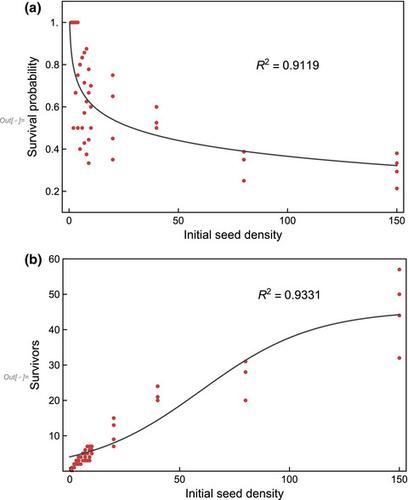当前位置:
X-MOL 学术
›
Ecol. Evol.
›
论文详情
Our official English website, www.x-mol.net, welcomes your
feedback! (Note: you will need to create a separate account there.)
The role of intraspecific competition between plants in a nursery pollination system—Comments on Villacañas de Castro and Hoffmeister 2020
Ecology and Evolution ( IF 2.3 ) Pub Date : 2020-10-21 , DOI: 10.1002/ece3.6837 Nicolas M Gutiérrez 1, 2 , Luciano Stucchi 1 , Javier Galeano 3 , Luis Giménez-Benavides 4
Ecology and Evolution ( IF 2.3 ) Pub Date : 2020-10-21 , DOI: 10.1002/ece3.6837 Nicolas M Gutiérrez 1, 2 , Luciano Stucchi 1 , Javier Galeano 3 , Luis Giménez-Benavides 4
Affiliation

|
We present comments on an article published by Villacañas de Castro and Hoffmeister (Ecology and Evolution, 10, 4220; 2020). The authors studied a tritrophic system composed of a plant, its pollinating seed predator, and a parasitoid of the latter. Their concern was whether the parasitoid modifies the interaction between the plant and its pollinator–herbivore along the mutualism–antagonism gradient, but they reduced their question to how the parasitoid impacts plant fitness. After showing that the parasitoid increases seed output of the plant by decreasing the amount of seeds consumed by the pollinating seed predator, they tested whether seed output is a good proxy for plant fitness. They argue that it is not by showing that the increased seed density has a negative impact on survival probability and flower production, likely due to plant intraspecific competition. The work presented shows careful experimentation and interesting results, but we do not share some of their conclusions. Most importantly, we believe that the net effect of the parasitoid on the plant–herbivore interaction cannot be adequately investigated by focusing on individual plant fitness. Thus, we first suggest considering the number of surviving plants up to adulthood as a proxy for population performance to address this question. Using this proxy, we show that the increase in seed output due to the parasitoid is beneficial to the plant population until its carrying capacity is achieved. Next, using a population dynamics model, we show under which particular conditions the negative effect of intraspecific competition outweighs the positive effect of seed density increase (due to parasitoid's defense). When these conditions do not hold, the role of plant intraspecific competition is basically limited to the prevention of unbounded population growth, while the parasitoid increases the plant's equilibrium density above its carrying capacity as measured when interacting only with the pollinating seed predator, thus making the system more stable.
中文翻译:

植物间种内竞争在苗圃授粉系统中的作用——Villacañas de Castro 和 Hoffmeister 2020 的评论
我们对 Villacañas de Castro 和 Hoffmeister 发表的一篇文章提出评论 (Ecology and Evolution, 10, 4220; 2020)。作者研究了由植物、其授粉种子捕食者和后者的寄生蜂组成的三营养系统。他们关心的是寄生蜂是否会沿着互利-拮抗梯度改变植物与其传粉者-食草动物之间的相互作用,但他们将问题简化为寄生蜂如何影响植物的适应性。在表明寄生蜂通过减少授粉种子捕食者消耗的种子量来增加植物的种子产量后,他们测试了种子产量是否可以很好地代表植物的适应性。他们认为,这并不是通过表明种子密度的增加对存活概率和花卉产量产生负面影响,这可能是由于植物种内竞争造成的。所提出的工作显示了仔细的实验和有趣的结果,但我们不分享他们的一些结论。最重要的是,我们认为寄生蜂对植物与草食动物相互作用的净影响不能通过关注个体植物的适应性来充分研究。因此,我们首先建议考虑将成年后存活的植物数量作为种群表现的代理来解决这个问题。使用这个代理,我们表明,由于寄生蜂导致的种子产量的增加对植物种群有利,直到达到其承载能力。接下来,使用种群动态模型,我们展示了在哪些特定条件下,种内竞争的负面影响超过了种子密度增加的正面影响(由于寄生蜂的防御)。 当这些条件不成立时,植物种内竞争的作用基本上仅限于防止无限制的种群增长,而寄生蜂将植物的平衡密度增加到超过其仅与授粉种子捕食者相互作用时测得的承载能力,从而使系统更加稳定。
更新日期:2020-11-13
中文翻译:

植物间种内竞争在苗圃授粉系统中的作用——Villacañas de Castro 和 Hoffmeister 2020 的评论
我们对 Villacañas de Castro 和 Hoffmeister 发表的一篇文章提出评论 (Ecology and Evolution, 10, 4220; 2020)。作者研究了由植物、其授粉种子捕食者和后者的寄生蜂组成的三营养系统。他们关心的是寄生蜂是否会沿着互利-拮抗梯度改变植物与其传粉者-食草动物之间的相互作用,但他们将问题简化为寄生蜂如何影响植物的适应性。在表明寄生蜂通过减少授粉种子捕食者消耗的种子量来增加植物的种子产量后,他们测试了种子产量是否可以很好地代表植物的适应性。他们认为,这并不是通过表明种子密度的增加对存活概率和花卉产量产生负面影响,这可能是由于植物种内竞争造成的。所提出的工作显示了仔细的实验和有趣的结果,但我们不分享他们的一些结论。最重要的是,我们认为寄生蜂对植物与草食动物相互作用的净影响不能通过关注个体植物的适应性来充分研究。因此,我们首先建议考虑将成年后存活的植物数量作为种群表现的代理来解决这个问题。使用这个代理,我们表明,由于寄生蜂导致的种子产量的增加对植物种群有利,直到达到其承载能力。接下来,使用种群动态模型,我们展示了在哪些特定条件下,种内竞争的负面影响超过了种子密度增加的正面影响(由于寄生蜂的防御)。 当这些条件不成立时,植物种内竞争的作用基本上仅限于防止无限制的种群增长,而寄生蜂将植物的平衡密度增加到超过其仅与授粉种子捕食者相互作用时测得的承载能力,从而使系统更加稳定。











































 京公网安备 11010802027423号
京公网安备 11010802027423号